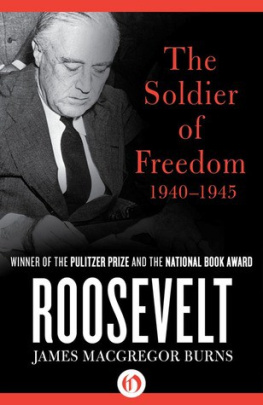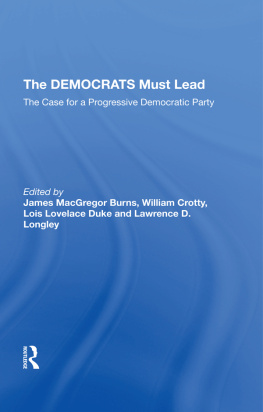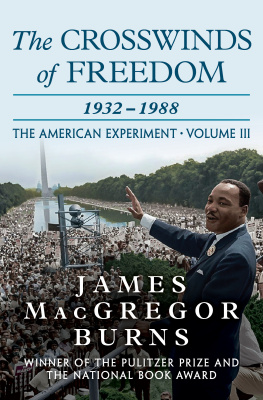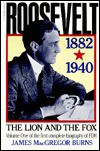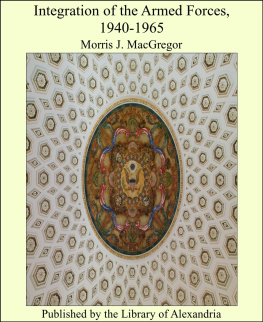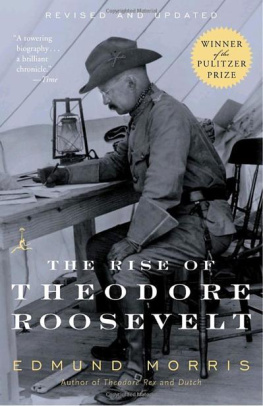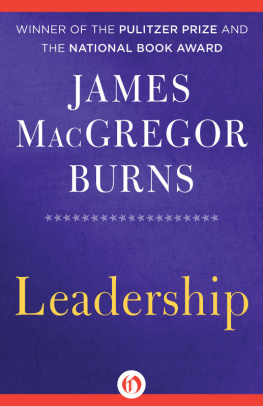James MacGregor Burns - Roosevelt: The Soldier of Freedom: 1940-1945
Here you can read online James MacGregor Burns - Roosevelt: The Soldier of Freedom: 1940-1945 full text of the book (entire story) in english for free. Download pdf and epub, get meaning, cover and reviews about this ebook. publisher: Open Road, genre: History. Description of the work, (preface) as well as reviews are available. Best literature library LitArk.com created for fans of good reading and offers a wide selection of genres:
Romance novel
Science fiction
Adventure
Detective
Science
History
Home and family
Prose
Art
Politics
Computer
Non-fiction
Religion
Business
Children
Humor
Choose a favorite category and find really read worthwhile books. Enjoy immersion in the world of imagination, feel the emotions of the characters or learn something new for yourself, make an fascinating discovery.
- Book:Roosevelt: The Soldier of Freedom: 1940-1945
- Author:
- Publisher:Open Road
- Genre:
- Rating:3 / 5
- Favourites:Add to favourites
- Your mark:
- 60
- 1
- 2
- 3
- 4
- 5
Roosevelt: The Soldier of Freedom: 1940-1945: summary, description and annotation
We offer to read an annotation, description, summary or preface (depends on what the author of the book "Roosevelt: The Soldier of Freedom: 1940-1945" wrote himself). If you haven't found the necessary information about the book — write in the comments, we will try to find it.
James MacGregor Burns: author's other books
Who wrote Roosevelt: The Soldier of Freedom: 1940-1945? Find out the surname, the name of the author of the book and a list of all author's works by series.
Roosevelt: The Soldier of Freedom: 1940-1945 — read online for free the complete book (whole text) full work
Below is the text of the book, divided by pages. System saving the place of the last page read, allows you to conveniently read the book "Roosevelt: The Soldier of Freedom: 1940-1945" online for free, without having to search again every time where you left off. Put a bookmark, and you can go to the page where you finished reading at any time.
Font size:
Interval:
Bookmark:


FOR
Joan
David
Stewart and Sally
Deborah
Trienah
Becky
Peter
A prince must have no other object and no other thought than war and its methods and conductfor this is the only branch of knowledge that is required of him who governs.The prince should read history, and give attention to the actions of great men related to it, and to examine the cause of their victories and defeats.A wise prince should practice such habits as these so that when Fortune grows contrary he may be found ready to assist her.
Machiavelli, The Prince, 1532
History with its flickering lamp stumbles along the trail of the past, trying to reconstruct its scenes, to revive its echoes, and kindle with pale gleams the passion of former days. What is the worth of all this? The only guide to a man is his conscience; the only shield to his memory is the rectitude and sincerity of his actions. It is very imprudent to walk through life without this shield, because we are so often mocked by the failure of our hopes and the upsetting of our calculations; but with this shield, however the Fates may play, we march always in the ranks of honour.
Winston Churchill to the House of Commons, November 9, 1940
Do you realize that there is no definitive (I hate the word) short history of any of our past wars?We oughtto capture or recapture the public pulse as it throbs from day to daythe effect on the lives of different types of citizensthe processes of propagandathe parts played by the newspaper emperors.It is war work of most decided value. It is not dry history.It is trying to capture a great dream before it dies.
Franklin D. Roosevelt to Archibald
MacLeish, June 9, 1943
THE PROPOSITION OF THIS work is that Franklin D. Roosevelt as war leader was a deeply divided mandivided between the man of principle, of ideals, of faith, crusading for a distant vision, on the one hand; and, on the other, the man of Realpolitik, of prudence, of narrow, manageable, short-run goals, intent always on protecting his power and authority in a world of shifting moods and capricious fortune. This dualism cleft not only Roosevelt, but also his advisers, separating Henry Stimson and others who acted consciously on the basis of the righteousness of their cause from those who followed the ancient practices of the Prince. And it divided the American people themselves, who were vacillating between the evangelical moods of idealism, sentimentalism, and utopianism of one era and older traditions of national self-regard, protectiveness, and prudence of another.
This dualism between the prophet and the prince was not clear-cut; nothing could be neat or tidy in the complexity of Roosevelts mind and heart or in the fuzzy ideology and volatile politics of Americans. Nor is it the only key to understanding Roosevelts war leadership. Several subthemes run through his war administration.
One such theme is the origin of the Cold War. While the roots of post-World War II hostility between Russia and the West are of course multifold, lying deep in Russian, European, and American history, I have concluded that the decisive turn toward the Cold War came during the war, at the very time when Anglo-American-Soviet relations were, on the surface, almost euphoricindeed, partly because they did seem euphoric.
Another theme is the transformation of the presidency. It was during World War II, in Roosevelts third term, rather than in the earlier New Deal years, that the foundations of modern presidential government were laid. The courts sustained presidential curtailment of liberties, such as those of the Japanese-Americans. Congress was surly and prickly on minor issues, generally acquiescent on the big. Under the pressure of war, the presidential staff proliferated; the presidential press had a wider role; the bureaucracy was refashioned for war.
A third theme is the alteration in American society. War is the forcing house of social change; World War II cut deep into the bone and marrow of American life. The vast migration of whites and blacks, the growth of a new culture of war at home and overseas, the creation of novel and ominous war industries, especially the atomic and electronicthese and other developments set off revolutions in the interstices of American society.
But always one must return to the division in the war strategy of Franklin Roosevelt and in the moods and practices of the American people, for that division informs all the lesser issues of the war. It was because Roosevelt acted both as a soldier bent on a military victory at minimum cost to American lives and as an ideologue bent on achieving the Four Freedoms for peoples throughout the world that his grand strategy was flawed by contradictions that would poison American relations with Russia and with Asia. It was in part because he ran the White House as a personal agency that subsequent Chief Executives had to deal with the acute problem of how the White House could master the bureaucratic giants springing up on the banks of the Potomac. It was in part because federal power during the war, especially over such matters as race relations, could not channel the fast-running social and economic currents that the war seemed to release, and bring them into balance with crucial sectors of life that burst out of control.
None of this, however, need diminish the stature of Roosevelt the man. He picked up Woodrow Wilsons fallen banner, fashioned new symbols and programs to realize old ideals of peace and democracy, overcame his enemies with sword and pen, and died in a final exhausting effort to build a world citadel of freedom. He deserves renewed attention today especially from those who reject the old ways of princes and demand that people and nations base their relations on ideals of love and faith. He was indeed, in all the symbolic and ironic senses of the term, a soldier of freedom.
J.M.B.
(Cartoons depicting the Roosevelt era, interspersed throughout the book, are not listed here.)
Hyde Park in the piping days of peace. Franklin D. Roosevelt receiving a medal on his 25th anniversary as an Odd Fellow in Hyde Park Lodge 203, September 16, 1938
President Roosevelt in Washington, Lincolns Birthday, 1940
Returning to the White House with Mrs. Roosevelt after the third inaugural, January 20, 1941
Roosevelt with Winston Churchill at the Atlantic Charter conference, Argentia,
Newfoundland, August 9-12, 1941. General George C. Marshall stands in the middle above.
The President reading the joint resolution by both houses of Congress declaring that a state of war exists with Germany and Italy, December 11, 1941
Hitler and Mussolini conferring in 1941
Emperor Hirohito of Japan
Joint press conference with Winston Churchill, Washington, D.C., December 23, 1941
Roosevelts secret war-plant inspection tour: Addressing workers at the Oregon
Shipbuilding Corporation, September 23, 1942. Henry J. Kaiser is in the back seat. Inspecting bomber production at the Douglas Aircraft Corporation, Long Beach, California, September 25, 1942
John Nance Garner visiting Roosevelt aboard the Presidents inspection-tour train, Uvalde, Texas, September 27, 1942
Lunch in the field: Lt. Gen. Mark Clark, President Roosevelt, Harry Hopkins, Maj. Gen. George S. Patton, Jr., Rabat, Morocco, January 21, 1943
Next pageFont size:
Interval:
Bookmark:
Similar books «Roosevelt: The Soldier of Freedom: 1940-1945»
Look at similar books to Roosevelt: The Soldier of Freedom: 1940-1945. We have selected literature similar in name and meaning in the hope of providing readers with more options to find new, interesting, not yet read works.
Discussion, reviews of the book Roosevelt: The Soldier of Freedom: 1940-1945 and just readers' own opinions. Leave your comments, write what you think about the work, its meaning or the main characters. Specify what exactly you liked and what you didn't like, and why you think so.

